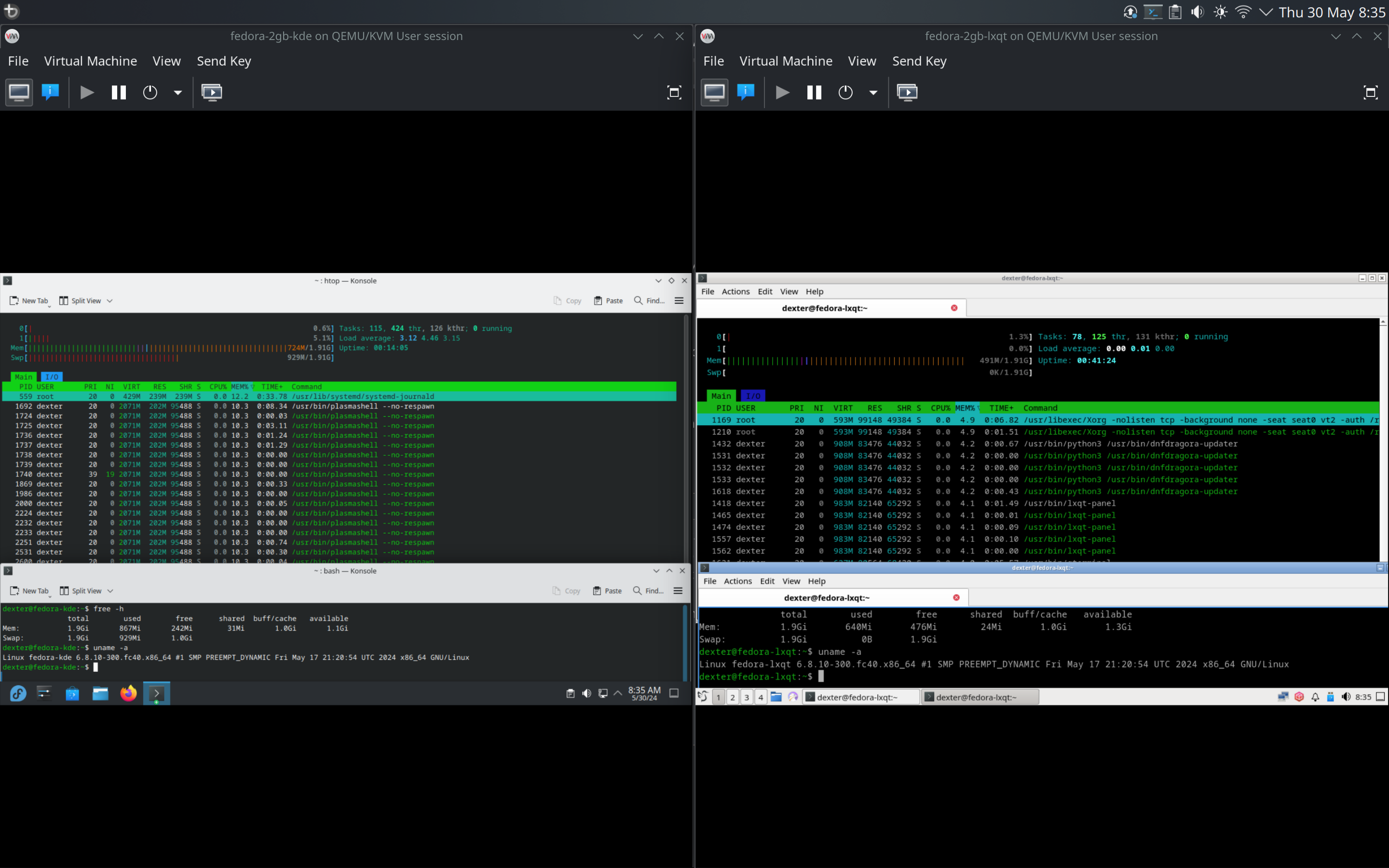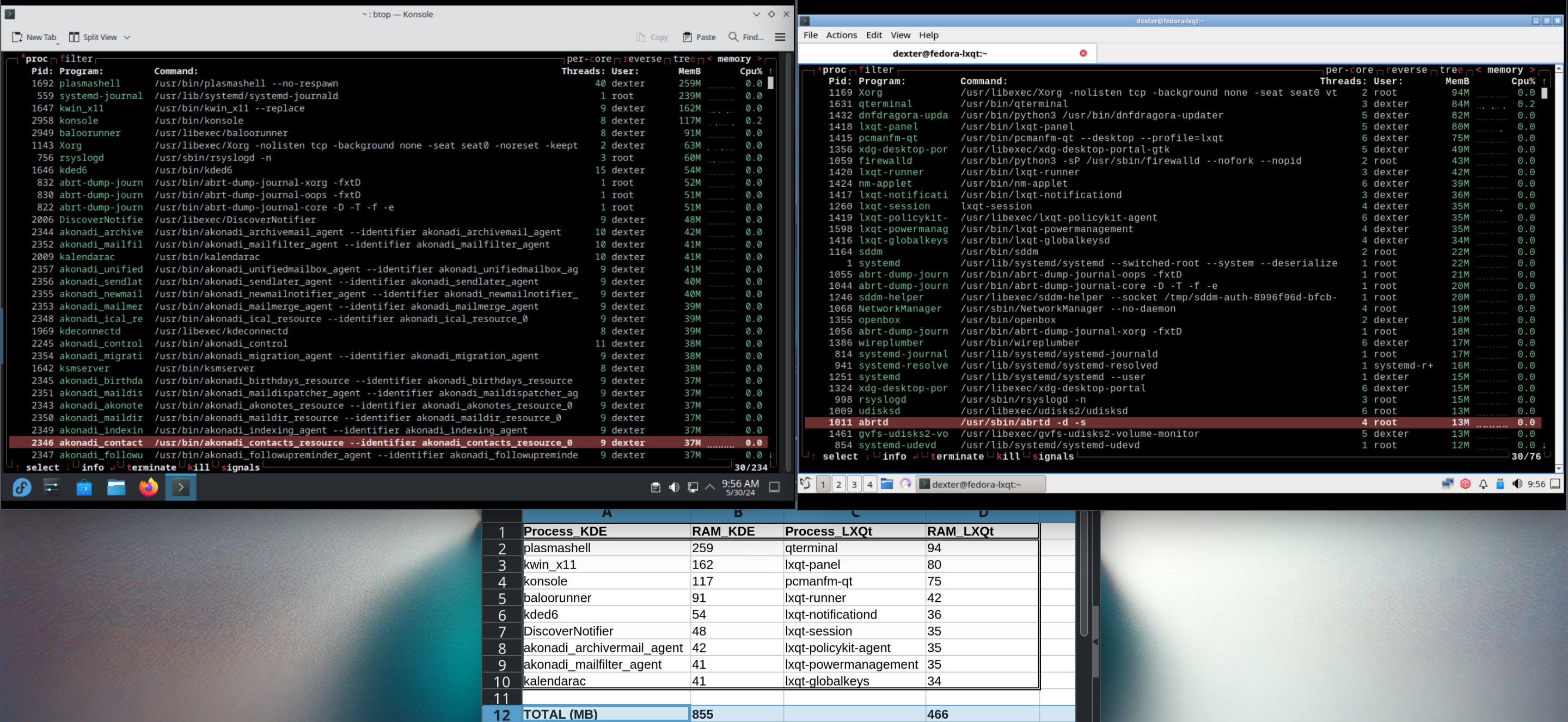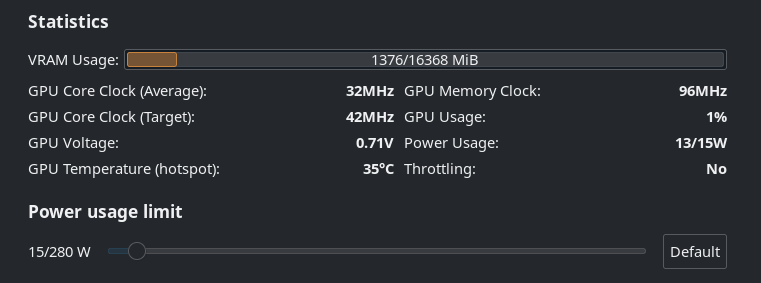Sorry about that - was just alerted to it. I've disabled the "other" option now. It was fine a few hours ago, looks like we have a sick troll here. :/
Serenity for sure. I love the 90s aesthetic and would like to see it make a comeback. At the very least I'd like to see their Ladybird browser become mainstream - we really need more alternatives to the Chromium family.
Nice, glad that got sorted. :) BTW could you edit the title please and mark it as [SOLVED]? Thanks!
I'm not moving any goalposts. You're the one arguing about the semantics around "Plasma", and I keep saying that's irrelevant.
Refer back to my original comment which was, and I quote:
So, are there any plans to reduce the bloat in KDE, maybe even make a lightweight version (like LXQt) that’s suitable for older PCs with limited resources?
To clarify, here I was:
- Referring to KDE + default apps that are part of a typical KDE installation
- Stating that a typical KDE installation is bloated compared to a typical lightweight DE like LXQt
- Saying with the intention that the "bloat" is RELATIVE, with respect to a older PC with limited resources
The ENTIRE point of my argument was the KDE isn't really ideal RELATIVELY, for older PCs with limited resources, and I'm using LXQt here are a reference.
In a subsequent test, here's a direct apples-to-apples(ish) component comparison:
| Component | Process_KDE | RAM_KDE | Process_LXQt | RAM_LXQt |
|---|---|---|---|---|
| WM | kwin_x11 | 99 | openbox | 18 |
| Terminal | konsole | 76 | qterminal | 75 |
| File Manager | Dolphin | 135 | pcmanfm-qt | 80 |
| File Archiver | ark | 122 | Lxqt-archiver | 73 |
| Text Editor | kwrite | 121 | featherpad | 73 |
| Image Viewer | gwenview | 129 | lximage-qt | 76 |
| Document Viewer | okular | 128 | qpdfview-qt6 | 51 |
| Total | 810 | 446 |
plasmashell was sitting at 250MB btw in this instance btw.
The numbers speak for themselves - no one in their right minds would consider KDE (or plasmashell, since you want to be pedantic) to be "light", in RELATION to an older PC with limited resources - which btw, was the premise of my entire argument. Of course KDE or plasmashell might be considered "light" on a modern system, but not an old PC with 2GB RAM. Whether something is considered light or bloated is always relative, and in this instance, it's obvious to anyone that KDE/plasmashell isn't "light".
I tested this myself on two identical VMs with 2GB RAM, one installed with Fedora 40 KDE, and another with Fedora 40 LXQt, both set to use X11 (because LXQt isn’t Wayland ready yet), both updated and running the latest kernel 6.8.10-300.fc40.
I logged into the DEs, opened only two terminal windows and nothing else, ran, and ran htop:

The KDE VM was unsable when I disabled swap - it completely froze on me. Meanwhile, LXQt chugged on just fine. Of
Of course, I could get rid of some bloat like akonadi, so I did that and rebooted my machine. Then I compared just the essential components, but I excluded plasmashell because it includes stuff like the panel and notifications, unlike LXQt where they're all separate components so you can't really compare them:
| Component | Process_KDE | RAM_KDE | Process_LXQt | RAM_LXQt |
|---|---|---|---|---|
| WM | kwin_x11 | 99 | openbox | 18 |
| Terminal | konsole | 76 | qterminal | 75 |
| File Manager | Dolphin | 135 | pcmanfm-qt | 80 |
| File Archiver | ark | 122 | Lxqt-archiver | 73 |
| Text Editor | kwrite | 121 | featherpad | 73 |
| Image Viewer | gwenview | 129 | lximage-qt | 76 |
| Document Viewer | okular | 128 | qpdfview-qt6 | 51 |
| Total | 810 | 446 |
plasmashell was sitting at 250MB btw in this instance btw.
You're arguing semantics and that's not the point I'm trying to argue here. Forget the term "Plasma". I don't really care about what the DE is branded as or what's in "Plasma" the software package. When I say "KDE", I mean the desktop + all the basic default/recommended apps that you'd see on a typical KDE installation, such as Dolphin, Konsole, Kate, Kalculator, Spectacle etc that's part of the KDE project. IDK whether the apps I've mentioned are considered part of "Plasma" or not, but again, that's not the point, I'm saying this is what I meant when I said "KDE" - and what most people would expect when they picture a "KDE" environment.
Anyways, I tested this myself on two identical VMs with 2GB RAM, one installed with Fedora 40 KDE, and another with Fedora 40 LXQt, both set to use X11 (because LXQt isn't Wayland ready yet), both updated and running the latest kernel 6.8.10-300.fc40. I logged into the DEs, opened only two terminal windows and nothing else, ran, and ran htop. The screenshot speaks for itself:

And when I tried disabling swap on both machines, the KDE machine was practically unusable, with only 53MB RAM remaining before it completely froze on me. Meanwhile, the LXQt one was still very much usable even without swap enabled.
I'd like to see you try running without swap and see how it fares. And if you think it's unfair disabling swap on a 2GB machine - try installing LXQt yourself, disable swap and see for yourself how much more usable it is compared to KDE.
And this is why I say KDE is bloated and not suitable for old machines.
Edit: Also, check out the memory consumption listed by a user in this post: https://lemmy.nz/comment/9070317
Edit2: Here's a screenshot of the top 30 processes on my test systems, side-by-side:

Of the above, I calculated the usage of the top 10 processes specific to each respective DE, and you can see that KDE's memory usage is almost double that of LXQt. Had I counted all the DE-specific processes, it'd no doubt be a lot more than double.
Do you have base-devel installed? If not, install that and try again.
Correct me if I'm wrong, but this #OptGreen project isn't talking specifically about Plasma, is it? They don't mention Plasma anywhere on the page they linked.
In any case, that's irrelevant, also, I don't doubt that KDE can't run at all under the specs you mentioned - that's not the issue. The question is, how much free/usable RAM do you actually have on that machine - let's say with no apps open first, and with then check again with Konsole + Dolphin + KWrite/Kate open? And for fun, fire up Konqueror as well and check again.
Edit: Screenshots proving that what you're saying is not correct:


I'm not talking specifically about Plasma, I'm talking about the "DE" part of KDE in general; and particularly in this context of repurposing and extending the life of old PCs.
I find it a bit ironic for KDE to be pushing this message, when it's a heavy DE (relatively speaking) - it's NOT what anyone would have in mind when when selecting a DE for an old PC.
For instance, take LXQt - run the default/recommended file browser, terminal and text editor, and compare it with KDE + equivalents - you'd see a significant difference in resource consumption. On a system with low RAM, that extra bit of free memory makes a big difference, as it could mean avoiding the penalty hit of the swap file, which you'd invariably run into as soon as you fire up a modern Web browser. So it's vital that the DE use as little resources as possible on such a machine.
So, are there any plans to reduce the bloat in KDE, maybe even make a lightweight version (like LXQt) that's suitable for older PCs with limited resources?



I've disabled the "other" option now, someone hijacked the poll. Guess that's what I get for allowing users to add their own options. >_<